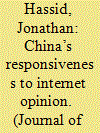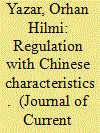|
|
|
Sort Order |
|
|
|
Items / Page
|
|
|
|
|
|
|
| Srl | Item |
| 1 |
ID:
139639


|
|
|
|
|
| Summary/Abstract |
Despite its authoritarian bent, the Chinese government quickly and actively moves to respond to public pressure over misdeeds revealed and discussed on the internet. Netizens have reacted with dismay to news about natural and man-made disasters, official corruption, abuse of the legal system and other prominent issues. Yet in spite of the sensitivity of such topics and the persistence of China’s censorship apparatus, Beijing usually acts to quickly address these problems rather than sweeping them under the rug. This paper discusses the implications of China’s responsiveness to online opinion. While the advantages of a responsive government are clear, there are also potential dangers lurking in Beijing’s quickness to be swayed by online mass opinion. First, online opinion makers are demographically skewed toward the relative “winners” in China’s economic reforms, a process that creates short-term stability but potentially ensures that in the long run the concerns of less fortunate citizens are ignored. And, second, the increasing power of internet commentary risks warping the slow, fitful – but genuine – progress that China has made in recent years toward reforming its political and legal systems.
|
|
|
|
|
|
|
|
|
|
|
|
|
|
|
|
| 2 |
ID:
139638


|
|
|
|
|
| Summary/Abstract |
The most common framework through which we understand media communication and political/social stability in China is that of hegemony and control. This characterization may have served us well in documenting how the mandate for stability often results in censorship, regulation and restriction, but it has two major faults: First, the focus on crackdowns, bans and censorship usually tells us something about what the party-state does not like, but does not convey much about what it does like. Second, it often obscures the routine ways the party-state and the market work together to shore up ideological domination and maintain stability. In this analysis of the policies, economics and content of a broad range of television programmes, I suggest that we look at the media and communication as an ideological-ecological system in order to arrive at a more nuanced understanding of the relationship between China’s media practices and its ongoing objectives.
|
|
|
|
|
|
|
|
|
|
|
|
|
|
|
|
| 3 |
ID:
139641


|
|
|
|
|
| Summary/Abstract |
Studies on public expression in China tend to focus on how the state and internet users (netizens) struggle over the limits of online expression. Few have systematically traced discourse competition within state-imposed boundaries, particularly how the authoritarian state has adapted to manage, rather than censor, online expression. This paper explores and evaluates the state’s attempts to manipulate online expression without resorting to censorship and coercion by examining the role of internet commentators, known as the “fifty-cent army”, in Chinese cyberspace. To cope with the challenge of online expression, the authoritarian state has mobilized its agents to engage anonymously in online discussions and produce apparently spontaneous pro-regime commentary. However, due to a lack of proper motivation and the persistence of old propaganda logic, this seemingly smart adaptation has proven ineffective or even counter-productive: It not only decreases netizens’ trust in the state but also, ironically, suppresses the voices of regime supporters.
|
|
|
|
|
|
|
|
|
|
|
|
|
|
|
|
| 4 |
ID:
139642


|
|
|
|
|
| Summary/Abstract |
The regulatory agency responsible for prudential supervision of the banks in China, the China Banking Regulatory Commission (CBRC), is not an independent authority. The agency’s regulatory actions are constrained by the central government, which has to balance the prudential and non-prudential consequences of bank regulation for its political survival. The conditions and limits of the government’s influence on the CBRC is analysed through an investigation of three regulatory cases. The conclusion is that the CBRC’s regulatory actions are determined by the relative importance of prudential outcomes for the government’s policy objectives.
|
|
|
|
|
|
|
|
|
|
|
|
|
|
|
|
| 5 |
ID:
139640


|
|
|
|
|
| Summary/Abstract |
China’s local governments are facing a crisis of public confidence and have struggled to handle political dissent and popular protests. In an attempt to promote political stability, local officials around the country have utilized Twitter-like microblog sites (微博, weibo) to upgrade their capability to influence citizens and engage in rapid information management. Through the analysis of microblogging by prominent propagandists whose identities and professions are known to the public, this article finds some evidence that microblogging could be helping cadres to win hearts and minds, although such microblogging poses new risks to the state as netizens challenge propagandists and state policies in exchanges that reveal political pluralism and disapproval of state policies. While venting on weibo may enable people to blow off steam, the reluctance (or inability) of official microbloggers to engage their critics in meaningful dialogue suggests the limited utility of official microblogging as a means of furthering political stability through the improvement of state–society relations.
|
|
|
|
|
|
|
|
|
|
|
|
|
|
|
|
|
|
|
|
|